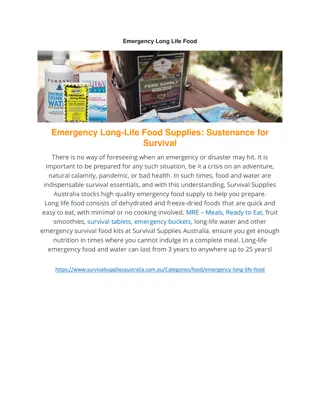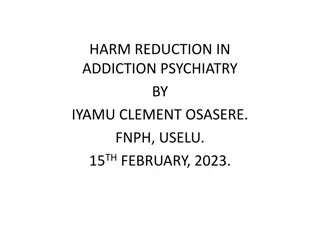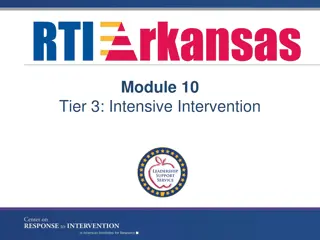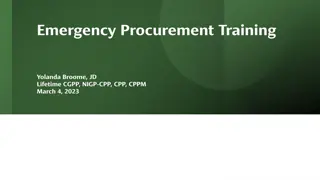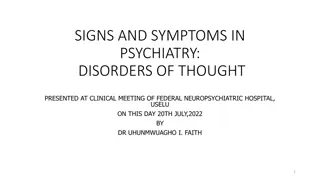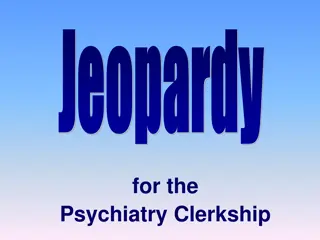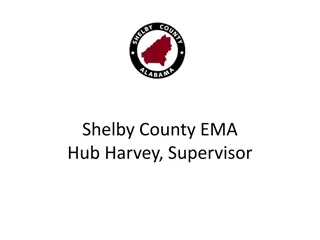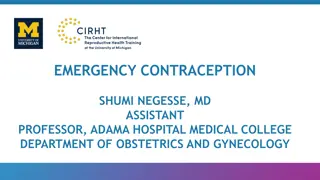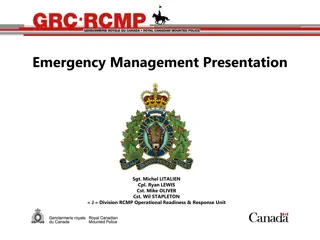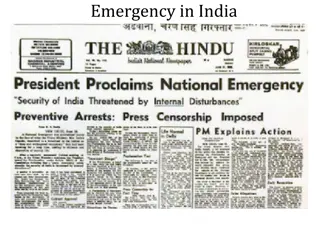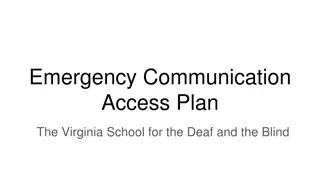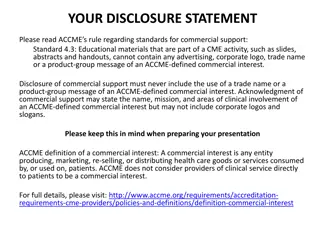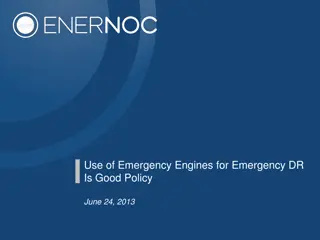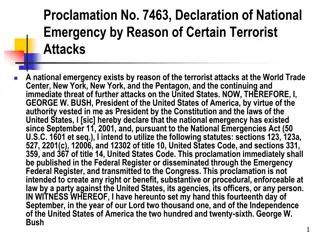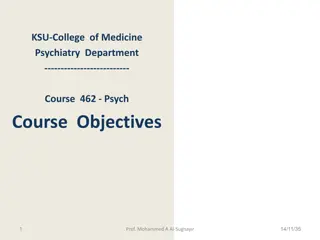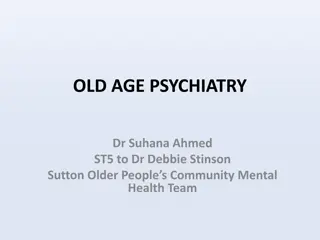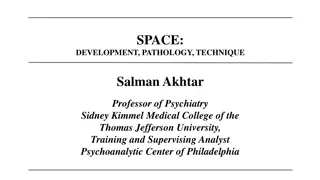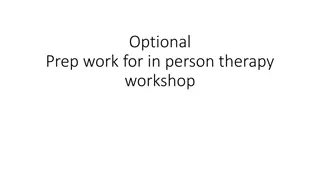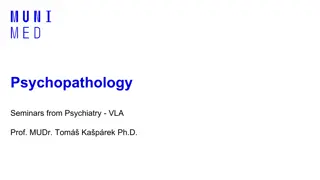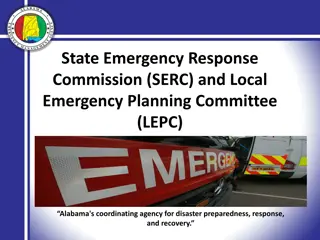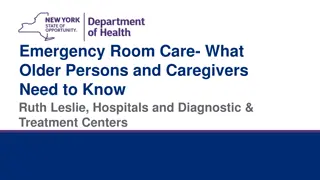Understanding Emergency Psychiatry: Critical Insights and Interventions
Explore the essentials of emergency psychiatry through insights into psychiatric emergencies, including neuroleptic malignant syndrome and serotonin syndrome, as well as emergencies of suicidality. Learn about assessment tools and resources for managing behavioral health crises effectively.
- Emergency Psychiatry
- Psychiatric Emergencies
- Suicide Risk Assessment
- Crisis Intervention
- Mental Health Resources
Download Presentation

Please find below an Image/Link to download the presentation.
The content on the website is provided AS IS for your information and personal use only. It may not be sold, licensed, or shared on other websites without obtaining consent from the author. Download presentation by click this link. If you encounter any issues during the download, it is possible that the publisher has removed the file from their server.
E N D
Presentation Transcript
Fundamentals of Emergency Psychiatry Pam Hoffman, MD 12/1/2022
Overview When do psychiatrists worry: Overview of psychiatric emergencies When should I worry: Discussion of crisis examples that may warrant emergency behavioral health evaluation What happens then: Process in the Emergency room when kids present What do I do: What a Pediatrician s role can be for patients with behavioral health crises 2 YALE CHILD STUDY CENTER
Psychiatric Emergencies Precipitated By Onset Identical Features Neuroleptic malignant syndrome Serotonin syndrome Dopamine Antagonists Serotonergic Agents Variable, 1-3 days Hypertension Tachycardia Tachypnoea Hyperthermia (> 40 C) Hypersalivation Diaphoresis Pallor Variable, stupor, coma, alert 'Lead-pipe' rigidity in all muscle groups Variable, < 12 hours Hypertension Tachycardia Tachypnoea Hyperthermia (> 40 C) Hypersalivation Diaphoresis Vital Signs Mucosa Skin Overlapping Features Mental Status Muscles Variable, agitation, coma Increased tone, especially in lower extremities Hyperreflexia Clonus (unless masked by increased muscle tone) Dilated Hyperactive Reflexes Hyporeflexia Distinct Features Pupils Bowel Sounds Normal Normal or decreased 3 YALE CHILD STUDY CENTER From <https://www.medsafe.govt.nz/profs/PUArticles/Dec2012Neuroleptic.htm>
Emergencies of Suicidality Passive Suicidality Thoughts of death or dying Thoughts that life isn t worth it Active Suicidality: Suicidal ideation Suicidal intent wish to act on the thought Suicidal plan specific (attainable) action to implement intentions Efforts to further plan 4 YALE CHILD STUDY CENTER
How to ask these questions Columbia Suicide Severity Rating Scale: or ASQ Ask Suicide Screening Questions Suicide Risk Screening Tool Outpatient Primary Care/Specialty Clinics Brief Suicide Safety Assessment Guide (PDF | HTML) Brief Suicide Safety Assessment Worksheet (PDF | HTML) ASQ Suicide Risk Screening Tool (PDF | HTML) Outpatient Suicide Risk Clinical Pathway (PDF | HTML) Mental Health Resources (PDF | HTML) Script for Nursing Staff (PDF | HTML) Parent/Guardian Flyer (PDF | HTML) Links to Videos (PDF | HTML) Information Sheet (PDF | HTML) 5 YALE CHILD STUDY CENTER
CSSRS: 6 YALE CHILD STUDY CENTER https://cssrs.columbia.edu/the-columbia-scale-c-ssrs/cssrs-for-communities-and-healthcare/#filter=.healthcare.english
Homicidal ideation, Aggression Homicidal ideation: Thoughts of killing person/s; (identified) Intent/plan: threats or have they furthered their plan Is it feasible? (e.g. I m going to buy a gun and shoot you said by a 7yo) Is it conditional? (e.g. If they fail me on this test, I m going to kill my teacher ) Aggression: Violence toward property Violence toward people 7 YALE CHILD STUDY CENTER
How to ask these questions Modified Overt Aggression Scale (MOAS)* Over a week look at: (weighted categories) Verbal Aggression Aggression against property Aggression against self Physical aggression 8 YALE CHILD STUDY CENTER
Psychosis and Perceptual disturbances Hallucinations: Auditory Visual Tactile* Delusions: Paranoia Not to be confused by: Interior monologue/negative thoughts 9 YALE CHILD STUDY CENTER
How to ask these questions Brief Psychiatric Rating Scale for Children Concise scale looking at: Behavior Problems (Items 1-3) Depression (Items 4-6) Thinking Disturbance (Items 7-9) Peculiar fantasies Delusions hallucinations Psychomotor Excitation (Items 10-12) Withdrawal (Items 13-15) Anxiety (Items 16-18) Organicity (Items 19-21) 10 YALE CHILD STUDY CENTER
Ideal Continuum of Crisis Services 11 YALE CHILD STUDY CENTER
Emergency Room evaluation 1. Triage in the ED by nursing 2. Medical evaluation by Pediatric Emergency Medicine Team 3. Behavioral Health consultation Social Work assessment on weekdays Psychiatric fellow assessment on weekends Crisis evaluation (not a complete psychiatric assessment) 4. Disposition planning Discharge with referrals Admission to inpatient 12 YALE CHILD STUDY CENTER
Emergency Psychiatry 13 YALE CHILD STUDY CENTER
Emergency Room process wait times 1. Triage in the ED (minutes hours) 2. Medical evaluation (minutes hours) 3. Behavioral Health consultation (can take up to 1 day) 4. Disposition planning Discharge with referrals IOP referral can take weeks IICAPS can take weeks Outpatient referral for therapy can take months Outpatient referral for med management can take months 211 can be same day/next day Admission to inpatient (can take up to 10 days) 14 YALE CHILD STUDY CENTER
What Can Pediatricians Do? A LOT! Continue your relationship with them Collaborate with providers (therapists, psychiatrists, school counselors) Safety plan with the family Safety-proof home recommendations for family (AACAP Facts for Families) 211 referrals 15 YALE CHILD STUDY CENTER
Additional References Emergency Psychiatry review: https://www.sciencedirect.com/journal/child-and- adolescent-psychiatric-clinics-of-north-america/vol/27/issue/3 CSSRS: https://cssrs.columbia.edu/wp-content/uploads/C-SSRS_Pediatric- SLC_11.14.16.pdf ASQ: https://www.nimh.nih.gov/sites/default/files/documents/research/research- conducted-at-nimh/asq-toolkit-materials/asq- tool/screening_tool_asq_nimh_toolkit.pdf 16 YALE CHILD STUDY CENTER



